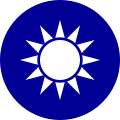| This article is part of a series on |
 |
|---|
This article lists the political parties in the Republic of China (Taiwan) from 7 December 1949.
The organization of political parties in Taiwan is governed by the Political Parties Act , enacted on 6 December 2017. The Political Parties Act defines political parties as "political groups consisting of Republic of China (ROC) citizens with a common political ideology who safeguard the free, democratic, constitutional order, assist in shaping the political will of the people, and nominate candidates for election to public office." [1] [2]
Prior to the passage of the Political Parties Act, political organizations in Taiwan followed the Civil Associations Act, also known as the Civil Organizations Act, promulgated in 1989. [1] [2] The Civil Associations Act required that groups held a convention to announce the formation of a political party, and within thirty days of the announcement, provide a list of party members and a party charter to the Ministry of the Interior. [3] Groups established when the Civil Associations Act was in effect should have revised their charters to comply with the Political Parties Act by 7 December 2019. To be compliant with the Political Parties Act, political groups must additionally convene a representative assembly or party congress for four consecutive years and have followed relevant laws and regulations governing the nomination of candidates to campaign in elections for public office for the same time period. Within one year of filing for political party status, a political group must complete legal person registration. The Ministry of the Interior requires that political parties submit annual property and financial statements. Political organizations that do not meet these regulations were dissolved and removed from the registry of political parties. [1] [2]











